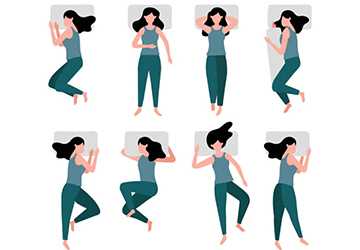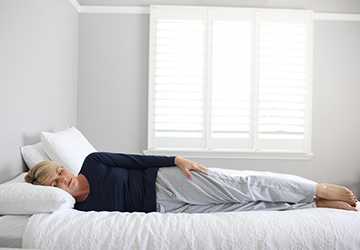How you sleep can reveal more than just your comfort preferences; it can provide insights into various aspects of your health. From your preferred sleep position to its impact on specific health conditions, understanding the connection between sleep posture and well-being is essential. In this guide, we explore what your sleep position reveals about your health and recommend optimizing your sleep quality.

Back Sleeping:
Insights:
● Snoring and Sleep Apnea: Back sleeping is often associated with an increased likelihood of snoring and sleep apnea. Gravity can cause the tongue and soft palate to collapse backwards, leading to airway obstruction and breathing issues during sleep.
Recommendations:
● Elevate Your Head: Using a pillow to elevate your head slightly can help reduce snoring and alleviate mild sleep apnea symptoms.
● Sleep on Your Side: If you're prone to snoring or sleep apnea, consider transitioning to a side-sleeping position for improved breathing.
Side Sleeping:
Insights:
● Digestive Benefits: Sleeping on your left side can promote better digestion and help alleviate symptoms of acid reflux or heartburn. This position allows the stomach to be positioned below the oesophagus, reducing the likelihood of stomach acid flowing back into the oesophagus.
Recommendations:
● Use Pillows for Support: Placing a pillow between your knees can help align your spine and reduce pressure on your hips, especially for those with hip pain.
Fetal Position:
Insights:
● Back and Neck Pain: While the fetal position can be comfortable for many, it may lead to back and neck pain, especially if the posture is too curled up. This position may also restrict diaphragmatic breathing.
Recommendations:
● Stretch Before Bed: If you prefer the fetal position, incorporate gentle stretches before bedtime to minimize muscle stiffness and reduce the risk of waking up with back or neck pain.
● Use a Pillow: Place a pillow between your knees to alleviate pressure on your hips and maintain a more neutral spine position.
Stomach Sleeping:
Insights:
● Neck and Spine Strain: Stomach sleeping can strain the neck and spine, leading to pain and discomfort. It may also contribute to nerve compression and tingling sensations in the arms and hands.
Recommendations:
● Transition to Side or Back Sleeping: To reduce strain on your neck and spine, consider transitioning to side or back sleeping. Using a body pillow or hugging a regular pillow can provide the comfort you might seek in the stomach position.
Starfish Position (Back with Arms and Legs Extended):
Insights:
● Pressure on Nerves: Sleeping in the starfish position may increase pressure on nerves, potentially causing discomfort and tingling sensations.
Recommendations:
● Use a Supportive Mattress: If you prefer the starfish position, invest in a supportive mattress that helps distribute your body weight evenly and reduces pressure on nerves.
Soldier Position (Back with Arms at Sides):
Insights:
● Snoring and Sleep Apnea: Similar to the back sleeping position, the soldier position may increase the risk of snoring and sleep apnea due to the tongue and soft palate falling backwards.

Recommendations:
● Adjust Sleep Environment: Elevate your head slightly using pillows to create a more inclined sleeping surface; this can help reduce the likelihood of snoring and improve breathing during sleep.
Recommendations for Better Sleep Regardless of Position:
1. Invest in a Quality Mattress: Choose a mattress that provides adequate support and comfort for your preferred sleep position. Mattresses vary in firmness, so finding the right one is crucial.
2. Pillow Support: Use pillows strategically to support your head, neck, and other pressure points. For back and side sleepers, consider using a contoured pillow that aligns with the natural curve of your neck.
3. Maintain a Consistent Sleep Schedule: Go to bed and wake up at the same time every day, even on weekends. Consistency reinforces your body's natural circadian rhythm, promoting better sleep quality.
4. Create a Relaxing Bedtime Routine: Establish a calming pre-sleep routine that signals your body that it's time to wind down, including activities like reading, gentle stretching, or practising relaxation techniques.
5. Limit Screen Time Before Bed: The blue light emitted by electronic devices can interfere with producing the sleep hormone melatonin. Aim to limit screen time to at least an hour before bedtime.
6. Optimize Your Sleep Environment: Keep your bedroom calm, dark, and quiet. Use blackout curtains, earplugs, or a white noise machine to create an ideal sleep environment.
7. Stay Active During the Day: Regular physical activity promotes better sleep, but avoid vigorous exercise close to bedtime. Engage in activities you enjoy, such as walking, cycling, or yoga.
8. Mind Your Diet: Be mindful of your eating habits, especially in the evening. Avoid heavy meals close to bedtime, and consider having a light, balanced snack if you're hungry.
9. Manage stress:
● Relaxation Techniques: Incorporate relaxation techniques into your bedtime routine, such as deep breathing, meditation, or progressive muscle relaxation. These practices can help alleviate stress and promote a calm mind before sleep.
● Limit Caffeine and Nicotine: Reduce or eliminate caffeine and nicotine consumption, especially in the hours leading up to bedtime. These substances can interfere with your ability to fall asleep and stay asleep.
● Address Sleep Disorders: If you suspect you have a sleep disorder, such as sleep apnea or insomnia, seek professional help. Consulting with a sleep specialist can lead to a proper diagnosis and effective treatment options.
● Create a Comfortable Sleep Environment: Ensure your bedroom is conducive to sleep; this includes investing in comfortable bedding, minimizing noise, and adjusting the room temperature to your preference.
● Limit Naps: While short naps can be beneficial, avoid long or irregular daytime naps, as they can interfere with nighttime sleep. Aim for 20-30 minutes if you need a nap, and schedule it earlier.
● Stay Hydrated, but Mindful: While it's essential to stay hydrated, be mindful of consuming excessive fluids close to bedtime to minimize disruptions from bathroom visits during the night.
● Regular Check-ups: Schedule regular health check-ups to address any underlying health issues affecting your sleep. Conditions like sleep apnea, restless legs syndrome, or chronic pain can significantly impact sleep quality.
The Importance of Individual Variation:
It's important to note that while sleep positions can offer insights into potential health implications, individual preferences and comfort play a significant role. The ideal sleep position varies from person to person, and what matters most is finding a position that allows you to sleep soundly and wake up feeling refreshed.
Conclusion:
Understanding the connection between sleep position and health can empower you to make informed decisions about your sleep habits. While certain positions may be associated with specific health considerations, the overall quality of your sleep is influenced by various factors.
Listening to your body, optimizing your sleep environment, and adopting healthy sleep practices can contribute to restful nights and improved well-being. If you have concerns about your sleep or suspect an underlying sleep disorder, don't hesitate to consult a healthcare professional or a sleep specialist for personalized guidance and solutions. Remember, achieving a good night's sleep is a dynamic and individualized journey, and finding what works best for you is vital to unlocking the benefits of quality rest.



